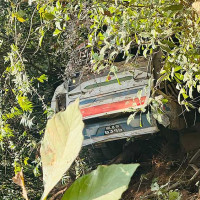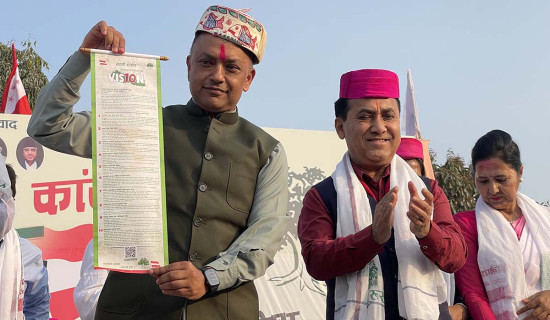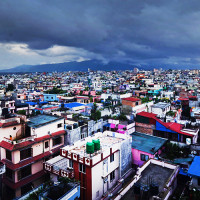- Thursday, 19 February 2026
Break Vicious Cycles In Economy
Nepal is in an underdevelopment trap, caused by several vicious cycles. Without breaking these vicious cycles, it would be hard to achieve prosperity. Then, without prosperity, Nepal has been witnessing frequent political changes. Recently, politics has entered a new phase with the Gen Z movement. As economic development and public service delivery do not meet people's expectations, aspirations, and needs, public dissatisfaction increases, leading to anti-government activities and frequent changes in government.
Many people are familiar with the vicious cycle of poverty, widely discussed in development economics. This vicious cycle perpetuates since the income of the residents of underdeveloped countries is low, which leads to low savings. When savings are low, investment is low, resulting in low capital formation. As a result, employment creation and productivity are low, leading to low income. The concept of foreign aid was introduced to break this vicious cycle after the Second World War.
Political instability
Moreover, the Nepali economy is also trapped in four other vicious cycles. The first is the vicious cycle of political instability. Due to political instability, it is difficult to maintain good governance and develop institutional capacity. This leads to corruption and poor performance. As a result, capital expenditure remains weak, investment does not increase, and employment is not created. Further, weak public service delivery and unemployment create dissatisfaction in society, promoting anti-government activities. Then, many believe that changing the government will solve the problem. This creates further political instability.
The second one is the vicious cycle of foreign employment. Due to the lack of domestic employment, many Nepalis have gone for foreign employment. As a large number of youths are going abroad for employment and studies, there has been a decrease in demand in the economy. As demand has decreased, sales of products have decreased, leading to less investment in the economy. As a result, there is low job creation, which further forces more youth to go for foreign employment. On the other hand, because of remittances inflows, it is easy to import from other countries. The more we import, the more domestic production is replaced, weakening the employment creation further.
The third one is the natural disaster vicious cycle. Nepal has mountainous terrain and rivers, which make it prone to floods and landslides. Roads, hydropower, and other physical infrastructure built during the winter are often destroyed by floods and landslides during the rainy season. Natural disasters cause huge losses of life and property every year. Due to this, the economy has not been able to make sustained progress. In recent times, road construction has been given more priority. But, it is not carried out scientifically, resulting in more soil erosion and disasters.
The fourth one is the vicious cycle of dependence created by a landlocked situation. Since Nepal is landlocked, Nepal cannot easily export. The cost of domestic production is also high, reducing the competitiveness of the Nepali products. As a result, domestic production and employment creation are badly impacted. When employment is not created, young people have to go for foreign employment. This has also contributed to the vicious cycle of foreign employment.
To break the vicious cycle of poverty, Nepal has been receiving foreign aid since 1951. Along with this, the process of planned development was also begun in 1956. Compared to 1951, Nepal has achieved many economic and social developments as reflected in a decline in poverty level, an increase in literacy rate, average life expectancy and per capita income. However, Nepal is still at the bottom of the development ladder, even behind in South Asia. The other vicious cycles mentioned above also play a role in this regard. In fact, it is necessary to break the other vicious cycles above to alleviate the remaining poverty level.
The most difficult thing is to break the vicious cycle of political instability. Nepal has practiced various types of political regimes, such as autocratic Rana rule, party-less Panchayat, constitutional monarchy with multiparty system, and federal republic. Now, Gen Z groups are demanding a directly elected executive prime minister or president. There is, in fact, no direct answer to how the vicious cycle of political instability can be broken.
As long as people do not understand that the governance system is only a means, not an end, the tendency to seek solutions through political change appears to persist. Only by enhancing good governance, institutional and individual capacity, transparency, accountability and credibility, perhaps the vicious cycle of political instability can be broken. There should be a shared vision and responsibility for the development of the country with coexistence and cooperation.
To break the vicious cycle of foreign employment, investment and production should be made in the domestic economy. Domestic production should be consumed. On the other hand, there should be social respect for labour, irrespective of the nature of jobs. The government should create a congenial environment to promote investment and entrepreneurship to generate employment.
Adaptation plan
To prevent the vicious cycle of natural disasters caused by climate change, development work should be carried out in an environmentally friendly way. Road digging should not be done unnecessarily in hilly areas using dozers. Measures should be taken to prevent landslides. Moreover, the climate change mitigation and adaptation plan should be implemented effectively. Nepal is also located in a seismic zone. It seems better to build strong structures by demolishing weak houses in advance, even before being hit by an earthquake.
The landlocked situation given by nature cannot be changed. To overcome the obstacles created by this situation, there is a need to prioritise information technology and tourism. A landlocked situation cannot stop the export of information technology services. Similarly, if we can bring more tourists, demand can be increased in the domestic economy. Agriculture and industry should be linked with tourism. Finally, the new government after the Gen Z movement should try to break the vicious cycle of the economy to make political changes permanent and sustainable. Other parties and stakeholders should also support.
(Dr. Shrestha is a former member of the National Planning Commission. praks.shrestha@gmail.com)



-original-thumb.jpg)











